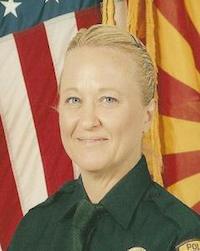Interview with Suzy Ivy, Police Detective and Author of Bad Luck Detective
Suzy Ivy has written three books, including Bad Luck Cadet & Bad Luck Officer. As Ms. Ivy relates her story in the interview, a mid-life crisis was the motivation for her foray into police work, and she has been hooked since. However, Suzy Ivy offers both sides of police work, from the deeply serious to those times when a sense of humor is all a police officer can retain to keep sane. In this illuminating interview, Suzy Ivy shares her reasons for joining law enforcement to the roller coaster ride that is often a part of everyday life as a police officer in a small town.
How did you decide to pursue a career as a police officer?
 My journey into law enforcement was unusual in that I was 45-years old when I entered the police academy. After suffering an extensive injury in a horseback riding accident, I realized life could be over in mere seconds. I set goals and decided I wasn’t too old to achieve a long-buried dream of becoming a police officer.
My journey into law enforcement was unusual in that I was 45-years old when I entered the police academy. After suffering an extensive injury in a horseback riding accident, I realized life could be over in mere seconds. I set goals and decided I wasn’t too old to achieve a long-buried dream of becoming a police officer.
What are a few guidelines you would offer the police officer just entering the field?
Police officers go through extreme stress day in and day out while on shift. Know your weaknesses. You will see humanity at its worst. Always be at your best. Ask for help from fellow officers and supervisors. You are not a one-man or woman crime crusader. You are part of a team.
How would you advise an individual entering the police professions to proceed? What challenges and obstacles may be faced?
I was told by my field training officer (FTO) that a police officer wasn’t worth much until they’d been on the job for five years. That rankled. Eight years later, I see the truth of that statement. You will make mistakes. Learn from them and never stop learning. Negativity eats away at law enforcement. Every day, find something positive and remember why you became an officer.
Tell us about an interesting case or project that you have been involved in. What was your role in helping to achieve a positive outcome?
I was told that victims of domestic violence go back repeatedly to their abusers, and to harden my heart to the helplessness police officers face when dealing with domestic situations. It was difficult, but I was seeing it with my own eyes more and more. A single case changed my outlook and taught me to trust my instincts and take one extra step when dealing with victims.
After years of mental and physical abuse, the suspect beat his wife in front of their young children. She’d put up with it for years, but it was always hidden, and she’d never reported her situation to anyone.
I took her statement and then made phone calls to find a safe place for her and her children. Before I left, she said, “I don’t want to go back to him.” So many victims swore they would never return, but they did. Here was someone who immediately saw no other option. I gave her my business card and wrote down my personal cell number. I told her she could call me anytime.
She did. She also used me as a reference when she went to the academy for the department of corrections. She’s a supervisor today, and she never went back to her abuser.
As an officer, never forget your humanity and never give up hope.
Tell us your best advice for someone just starting their career as a police officer.
Always go home to your family. Safety is never underrated!
A badge does not make you above the law. You should live by a higher standard. Traffic laws along with other laws are meant for you too.
What are the most important technological advances that have taken place in law enforcement over the past several years that have positively impacted your profession?
The use of video cameras in stores, gas stations, traffic lights, etc. gives officers a step-by-step progression of victims and suspects. I once had a homicide where I was able to track the victim within three minutes of the shooting and solve the case.
Tasers would be the second-best technological advancement in my opinion. Having a non-lethal means to handle dangerous situations saves lives.
What is your biggest strength as a police officer?
Without question, compassion. I’m now a detective and my goal is getting people to talk to me. I treat them fairly, keep my word, and never talk down to anyone. This doesn’t mean I’m weak or that I can’t be aggressive when necessary, but it does mean people trust me and tell me things they wouldn’t say to other cops. I shake hands, give an occasional hug, and remember my badge makes me no better than anyone else. I just choose to make better decisions.
We really appreciate Suzy Ivy for generously sharing her time, wisdom, and advice with our audience.
